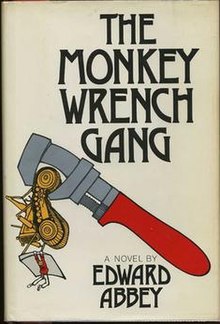
The Monkey Wrench Gang by Edward Abbey
This year I'm launching a new elective at my school called Wilderness Studies. In addition to helping students deepen their thinking about wilderness, I'd like to connect them with literature about the outdoors. So many students read Hatchet and love it -- but never find another outdoorsy book they connect with as much. I read this one back in college, and thought it might be a good option for students.
The best part of the book, in my mind, is its opportunity for catharsis. It tells the story of three New Mexico strangers who meet on a raft trip down the Grand Canyon and who are drawn together for their disdain for modern encroachments into wild lands. So they decide to take action. They topple billboards, sabotage road-building equipment, and blow up bridges, all the while brilliantly evading their hapless pursuers. Their dream -- and I won't reveal whether they reach it -- is to topple the Hoover Dam, thus restoring Glen Canyon to its original beauty and rewilding the Colorado River. It is wonderful to see people fighting against modern consumerism and laziness and thoughtlessness and arrogance in such a brazen, successful way. I myself would love to blow up Rte. 107/12 between Pittsfield and Bethel and return the White River Valley to its wild state. What fly fishing it would be! Hayduke lives!
But I will say Ed Abbey has some strange ideas about wilderness. For the characters, and one can only assume Abbey himself, wilderness seems to be a place of unbound recreation for them. After all, they declare their love for littering roadsides with beer cans. Why? They don't like the road. And yet they love roads, as long as they are rough enough to keep their pursuers at bay but not so rough as to prevent their passage. It seems like a pretty selfish view of the wilderness.
The nail in the coffin for the book, at least for its inclusion in the course, though, is the way Abbey writes about the lone female character, Bonnie. She is, throughout the book, treated as an object. Abbey mentions her looks nearly every time she mentions her: "She looked lovely that morning: fresh as a primrose, the large violet eyes bright with exuberance and good humor, her mane of hair fragrant and rich, brushed to the gloss of burnished chestnut, glowing with glints of Scots copper" (165). Right. There is even a moment in the book when Hayduke rebuffs Bonnie's advances because he wants to ask Doc his permission to begin a relationship with her. As if Doc owned her. And all the while Bonnie knows these men are more or less bumbling idiots, she just can't resist them. She is definitely a figment of Abbey's imagination, his dream of a woman irresistibly and unquestionably drawn to his curmudgeonly self. I couldn't put the book in front of students without lots of discussion of this serious flaw in the book. And since these book clubs are meant to be more or less self run, that wasn't happening.
No comments:
Post a Comment